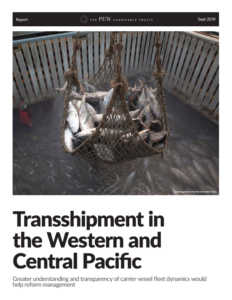The transshipment of catch, which enables fresh fish to get to market sooner, is a significant but largely hidden part of the global commercial fishing industry. Transshipment regards hundreds of refrigerated cargo vessels, or carrier vessels, roaming the oceans, taking in catch from thousands of fishing vessels and transporting it to shore for processing.
As The Pew Charitable Trusts says, moving catch from one ship to another may seem innocuous, but most transshipments occur far out at sea, where out of the sight and reach of authorities, unscrupulous fishing vessel operators can obscure, manipulate, or otherwise falsify data on their fishing practices, the species or amounts caught or transferred, and catch locations.
[smlsubform prepend=”GET THE SAFETY4SEA IN YOUR INBOX!” showname=false emailtxt=”” emailholder=”Enter your email address” showsubmit=true submittxt=”Submit” jsthanks=false thankyou=”Thank you for subscribing to our mailing list”]
According to extensive data from regional fisheries management organizations (RFMOs), such activity seems to be widespread, indicating a lack of monitoring and control due to the tracking of these transfers. Even when transshipment takes place in port, adequate oversight cannot always be guaranteed as because some ports do not have enough monitoring capacity.
What is now at stake are the efforts to enhance the health of diminishing fish stocks. Namely, in the western and central Pacific Ocean, more than US$142 million worth of illegal, unreported, and unregulated (IUU) product is transshipped each year, according to a 2016 study, most of which is misreported or not reported by licensed fishing vessels. These activities, according to Pew Trusts, undermine fisheries conservation and management efforts, while also contributing to global overfishing.
To better understand transshipment operations, The Pew Charitable Trusts combined commercially available satellite automatic identification system (AIS) data with the application of machine learning technology, aiming to analyse the movements of carrier vessels that operate in the Western and Central Pacific Fisheries Commission (WCPFC) Convention area in 2016.
Incomplete use of AIS by WCPFC-authorized carrier vessels limited Pew’s ability to comprehensively examine and draw conclusions about carrier vessel fleet dynamics. But analysing AIS data provided an opportunity to better understand overall WCPFC carrier vessel fleet movement patterns—including spatial dynamics, voyage profiles and the most frequented ports
That data presented that at least 140 carrier vessels operated in WCPFC Convention area waters in 2016, but only 25 vessels reported high seas transshipments. According to the combined analysis of AIS data and publicly available reports to WCPFC, a strong possibility exists that more at-sea transshipment events took place that year than were reported by carrier vessels themselves or by relevant flag or coastal State authorities.
What is more, unauthorized carrier vessels probably conducted transshipment activities in WCPFC-managed waters that included, in part, transferring WCPFC-managed species.
Moreover, Pew cross-referenced the AIS track histories of carrier vessels and movement patterns consistent with transshipment behaviour against publicly available information on carrier ships and transshipments reported by the WCPFC secretariat and Commission members.
The analysis concluded to a baseline profile of the behaviour and trends of authorized carrier vessels in the Pacific. Pew discovered that transshipment management in WCPFC-managed waters is affected by a lack of reporting information, non-compliance with reporting requirements, and non-standardized reporting responses.
For this reason, Pew suggests that three parts of the transshipment regulatory framework be improved: reporting, monitoring and data sharing.
Transshipment reporting would be much more complete and uniform by:
- Requiring that all events be reported, regardless of location or origin of catch;
- Updating and standardizing all reporting and notification forms and including minimum data collection requirements for both target and by-catch species;
- Mandating notifications of intent to transship when carrier vessels enter WCPFC waters, including confirmation of compliance with near-real-time vessel monitoring system (VMS) reporting and observer carriage requirements;
- Requiring electronic notifications and declarations within the 24 hours before and after each event, regardless of location;
- Mandating the presence of observers on all vessels involved in transshipping and requiring submission of observer reports after each event as an independent means of verification;
- Requiring that the secretariat conduct annual audits of transshipment reporting and carrier vessel activities, using both public and non-public domain data.Transshipment monitoring would be much more effective by:
- Requiring 100 per cent observer coverage (human and/or electronic) on all vessels involved in transshipment, regardless of location;
- Establishing minimum standards for collecting carrier observer information;
- Ensuring that all vessels engaged in transshipment have access to a pool of trained and certified carrier observers who collect information for both scientific and compliance purposes;
- Requiring that all vessels engaged in transshipment have an operational VMS unit on board to help authorities monitor and track vessels port to port in near-real time;
- Mandating manual reporting and vessel monitoring arrangements if VMS units malfunction or fail;
- Considering requiring AIS usage by all WCPFC-authorized vessels as a supplement to VMS to make activities more transparent and improve overall vessel monitoring.Transshipment data sharing would be much more effective by:
- Establishing and harmonizing transshipment data-sharing procedures among all relevant national authorities and the secretariat;
- Expanding the data-sharing agreement between the WCPFC and the Inter-American Tropical Tuna Commission (IATTC) to include sharing of all transshipment-related data and involving the IATTC’s carrier observer service provider;
- Establishing a data-sharing agreement with the North Pacific Fisheries Commission (NPFC) to include sharing all transshipment-related data.
You may see more information the PDF herebelow































































